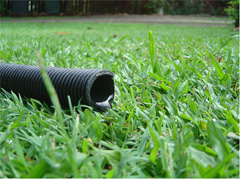
On farms, greywater – which is household wastewater (excluding toilet water) – can be used to supplement water supplies for irrigation, particularly for non-edible plants and landscape watering. This promotes water conservation and reducing reliance on freshwater sources.
In the home, greywater can be used for laundry and toilet flushing. Outside of the home, greywater can be used to water lawns and garden plants (but not vegetables), and keep dust down around the house, sheds and yards.
Things to consider
Unless you have a proper treatment facility you should not store greywater (over 24 hours).
You can use greywater in three ways:
- Manual bucketing – collecting water in a bucket (e.g. from the washing machine or shower and watering the garden). This is the cheapest option.
- Greywater diversion – these systems divert greywater to a small holding tank and then to an irrigation system below the soil surface.
- Greywater treatment – these systems clean greywater enough to be stored and can be used in any weather. It is not clean enough to drink but can be used to flush toilets, wash clothes and water the garden.
Two key benefits of using greywater include the reduced need for freshwater and the reduction in the amount of wastewater entering septic systems and sewers.
Take care when using greywater. It has the potential to make people in your household unwell and kill plants. Make sure your pets and livestock don’t drink greywater and that it doesn’t run into creeks or other waterways. There are also biodegradable washing products that make your greywater safer to use.
Find out more about this topic on Better Health Channel.
Fast facts:
- Greywater from basins, washing machines, showers and baths can be used. Do not use water from toilet systems.
- Use greywater with care. Don’t store greywater; use it within 24 hours on your garden or for keeping dust down around buildings and in dry areas.
- Make sure greywater does not run or leach into creeks, dams or other waterways and do not use it for livestock or other animals.
- Check your local greywater regulations as they differ around Australia.
References used for this topic
More information:
Australian Department of Sustainability, Environment, Water, Population & Communities
Guidelines for developing recycled water schemes in horticulture
Sustainable Earth Technologies
Greywater treatment
Better Health Channel
Greywater – recycling water at home
|
|